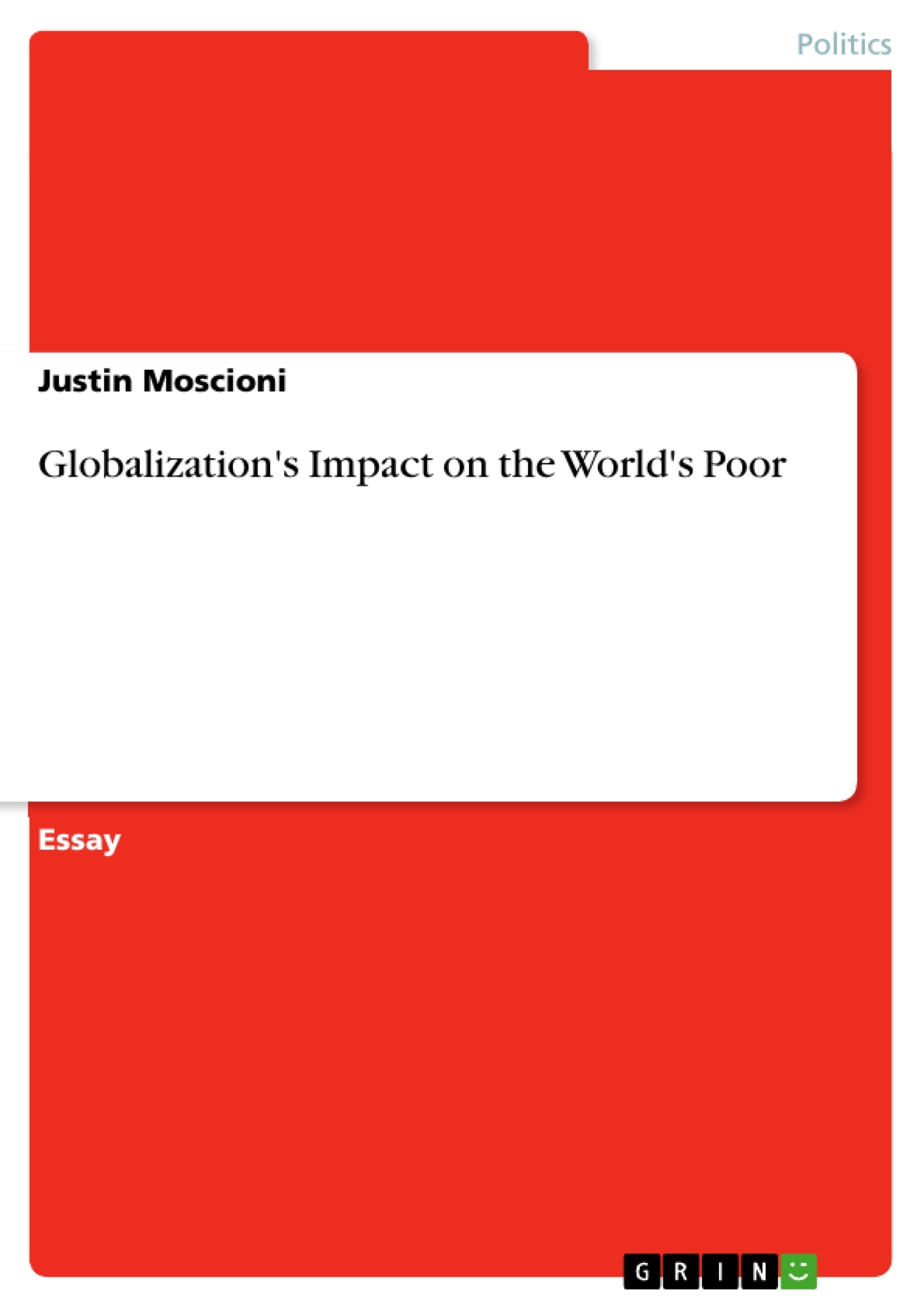Excerpt
Globalization is a controversial topic in regards to its effectiveness in alleviating people at or below the poverty line. Some suggest that globalization makes those in poverty worse off, while others believe the opposite. Usually, other factors have to be taken into consideration for either case to be absolute. Globalization has both advantages and disadvantages that could lead to much more wealth for a nation or it could leave many people financially destitute and unemployed. Naturally, there are two sides, the first accompanied by more wealth would lead these people to further promote globalization while the second which now lacks economic security leans heavily toward protectionism. One must look at both cases to determine the true cost and benefits of globalization. Some people says globalization helps everyone while others believe it helps some at the cost of others. Perhaps it works for both sides, or at least help one side while not making the other side worse off.
One of the largest factors at play when determining whether or not globalization is harmful or helpful for the worlds poor is the political atmosphere in the country that is opening up its trade horizons. Globalization can take jobs away from a country but it can also bring new jobs. However, these new jobs are often different and may require different skills and expertise. For example, Mexico lost many labor intense manufacturing jobs to its Asian counterparts, yet the facts still show poverty declining in areas of Mexico that are more involved in the international economy. It also showed an increase in income in Mexican states that were more involved with globalization. Industries that are most likely to be negatively affected by globalization often seek government protection, which in turn can hurt poor countries. Perhaps a better solution would be governments helping by paying for those workers to be trained with new skills for the new jobs globalization will bring to the country, instead of subsidizing an industry and creating import tariffs. This way, those workers will be able to find new jobs and not have to worry so much about unemployment and losing everything they have worked hard for.
When domestic policies like retraining workers to make them marketable to new jobs are in place, the globalization process does not necessarily make the poor worse off. However, when regimes are in place that only help the rich become richer, opening the economy to trade can have a negative effect on the poor. Shifting a countries production to more marketable goods can offset the deficit left from jobs that were lost to other markets. Therefore, it can be viewed that when the correct institutions are in place and proper government assistance measures are taken, globalization can aid in reducing poverty while boosting the home economy. This can be a heavy burden for less developed countries with governments that are uncaring for their population’s poor.
Globalization has the ability to greatly help the worlds poor. Yet, it is key that governments provide the right tools and training to help people find new jobs instead of just protective measure which may help one industry but harm the same industry in another less developed nation that can potentially produce the same good or service more efficiently. Protection measures usually drive the costs up for the good or service for everyone while only benefiting a small group of people. While globalization has the potential to harm a small group of people or industry while benefiting a much larger group or industry, it is possible for globalization to not hurt the small group of people or a particular industry but it also may not make it improve. Some groups or industries that were worse off than before an open economy may see major benefits to the liberation of trade. It can be determined that while some may benefit more than others, as long as globalization does not make one group better off at the expense of another, it can provide improvement for people at or below the poverty line (as seen with the states in Mexico example that were more involved with open economies). Conclusively, globalization can hurt the poor, but it has more potential to help the poor as long as the correct institutions and government policies are in place during the process.
References
Bardhan, P. (2006, March 26). Does globalization help or hurt the world’s poor? Overview/globalization and poverty. Retrieved October 15, 2016, from Scientific American, https://www.scientificamerican.com/article/does-globalization-help-o-2006-04/
Frieden, J. A., Lake, D. A., Schultz, K. A. (2016). World Politics: Interests, Interactions, Institutions. New York, NY. W.W. Norton Company, Inc.
- Quote paper
- Justin Moscioni (Author), 2016, Globalization's Impact on the World's Poor, Munich, GRIN Verlag, https://www.grin.com/document/352788
Publish now - it's free






















Comments